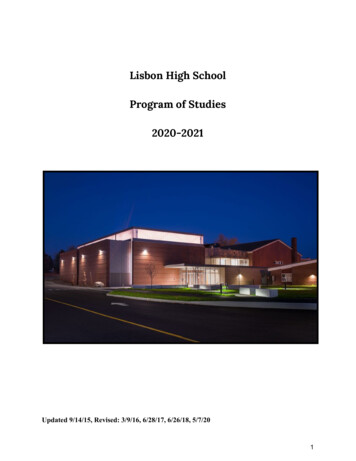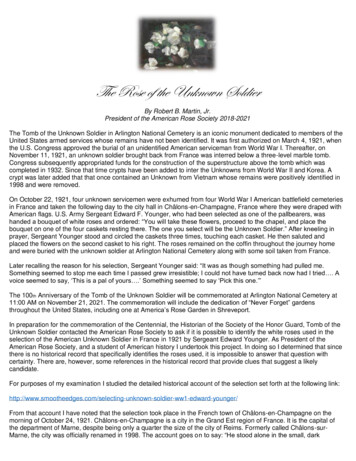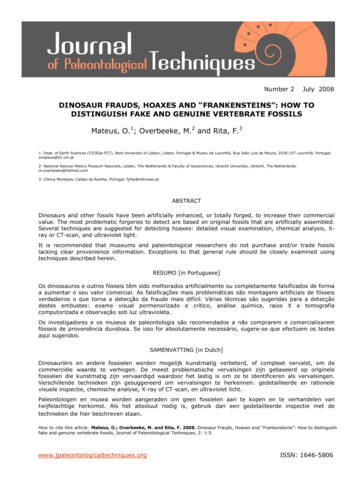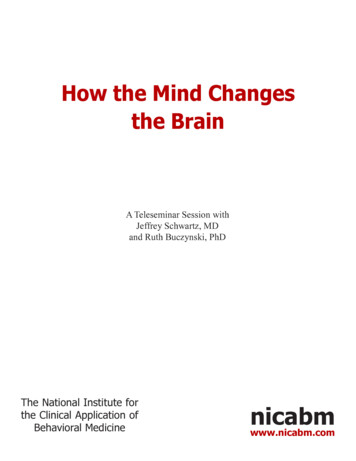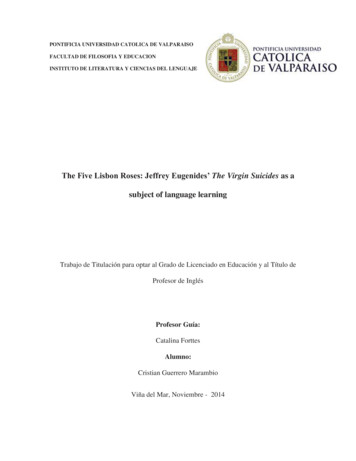
Transcription
PONTIFICIA UNIVERSIDAD CATOLICA DE VALPARAISOFACULTAD DE FILOSOFIA Y EDUCACIONINSTITUTO DE LITERATURA Y CIENCIAS DEL LENGUAJEThe Five Lisbon Roses: Jeffrey Eugenides’ The Virgin Suicides as asubject of language learningTrabajo de Titulación para optar al Grado de Licenciado en Educación y al Título deProfesor de InglésProfesor Guía:Catalina ForttesAlumno:Cristian Guerrero MarambioViña del Mar, Noviembre - 2014
Table of ContentsIntroduction . . 4Literature Review 71. What is literature?.72. Why teaching English through literature 83. What is Young Adult Literature?.94. Content and themes . .104.1 About the author . . .104.2 Synopsis of the novel . 104.3 Genre of the novel . .114.4 Themes embedded in the novel .124.5 Reasons to teach The Virgin Suicides .134.6 Learning English through literature (The Virgin Suicides) 144.6.1 Perspective and Critical Thinking .154.6.2 Discussing Prejudice in the classroom . .154.6.3 Why to teach about prejudice and perspective 165. The affective filter 162
6. Communicative approach . .18Syllabus . .191. Target audience . .192. Type of Syllabus . .193. Needs analysis . 203.1 Needs analysis questionnaire .21Workshop description .24Rationale. 24Workshop organization 25Course objectives .25Expected learning outcomes . .26Course policy .26Evaluations .27Rubrics 28Syllabus chart and topics . .30Lesson Samples . .32References . 523
IntroductionLearning English is nowadays a required aspect of the curriculum in every school inChile. Therefore the challenge we have, as teachers, is to look for new ways of teachingEnglish and make it appealing for the students.One of the ways in which English can be taught in the classroom is by usingliterature. Even though using literature to teach English can be a great resource of learning;it can be also a challenge as most students, especially teenagers, think that reading issomething boring because it is not a story of nowadays. Some of the books students have toread were written even centuries before they were born, and they find it hard to make aconnection with the way in which these stories are told. To make it more interesting for thestudents; the teacher should help the students to see the text in a more deep way, and notletting them with just the meaning of the words that is on the surface of the text.If we think of the benefits of using literature to teach English; Shanta Naik (2011,chap. 12) claims that literature can be used in the English class for 3 main reasons:1. It is authentic material2. It encourages interactions. Meaning that it can be used to effectively startdiscussions and share feelings or opinions among students guided by theteacher.3. Literature educates the whole person. By examining values in literary texts,teachers encourage learners to develop attitudes towards them. These values andattitudes relate to the world outside the classroom.4
Given that the literary works are classified as authentic material that produces acertain text in where the learners can get a grasp of the culture in which the story of thebook takes place. This is of great value for developing a better understanding of the culturalaspect needed when learning a second language.The cultural differences that exist and may appear in their process of learningshould be used in the classroom to create an atmosphere of respect and learning. For thatpurpose the book -The Virgin Suicides- by Jeffrey Eugenides has been chosen as the vesselof such important task. The Virgin Suicides is the story of “The Lisbon girls” told by thedifferent points of view of a group of boys which become obsessed with them. Literaturecan be used to overcome prejudices and become a highly motivating challenge whenteaching English since it deals with themes such as the love the boys feel for the girls thatallows them after the girls are dead, to construct a whole story trying to decipher the girls'mysterious lives and deaths.This project aims to show the learners that perspective and prejudice are importantaspects in the life of every person since they sometimes are a barrier to communicate withothers and we should learn to overpass those kinds of obstacles to have a more effectivecommunication and to allow the student to understand that the opinions of other are alsoimportant as their own in order to accept the point of view of others. This will be possibleby analyzing the different points of view of the narrators of the story and discussing themthrough different activities during the development of the workshop.5
This project is intended for second year high school students as an electiveworkshop that will allow them to practice their communicative skills in English in a writtenand oral way.6
Literature Review1. What is literature?Literature is hard to define. What we all give for a fact is that when we talk aboutliterature we are talking about a written text. According to Terry Eagleton (1983, p. 2)literature “is definable ( ) because it uses language in peculiar ways” he adds that“literature transforms and intensifies ordinary language, deviates systematically fromeveryday speech.” So we could say that for something to be literature it has to possess aliterary merit.Following the same directions mentioned above we have to argue that not all“literature” is written in the same way; according to Lewis Turco (1999, p. 9) “the types ofwriting to be found in literature are called genres; the primary genres are fiction, drama,poetry, and nonfiction,” and all of these genres have also sub-genres. But one importantquestion seems to arise when we start to describe literature following two of the fourgenres: What is fiction and what is non-fiction in literature? In simple words fiction iswriting that is not true or real while nonfiction it is writing that usually is true or real.For the purposes of this project literature will be understood as a work of fiction thatpossesses literary merit and will provoke interesting discussions in class given the fact thatif reflects on human experience and students will connect with this idea since the samehuman experiences reflect on literature might reflect their own experiences as humanbeings.7
2. Why teaching English through Literature?Jonathan Sell (2005) states that literature as a means for teaching literature is usefulfor two reasons. The first one is for that literature is “motivating material” meaning thatgiven the fact that literature is authentic material it is more interesting for students than abook of exercises. The second reason Sell provides is that literature is “open tointerpretation” meaning that every person that reads a book gets a different point of view ofthe story the books is telling which given the nature of this project is beneficial as itprovides an environment of interaction between the students allowing them to share theirinterpretation of the novel with one another under the guidance of the teacher.The EFL class is a place for students to learn about the English-speaking countrieswith the guidance of the teacher and the use of literature. It is also the first step tounderstand how cultures work in ways that are different or similar from our own. Teachingthrough literature is an important means to show the students how language learning is builtaround cultural connections rather than just a grammatical system. This does not mean thanthis is not important, but more importance is going to be given to how students will be ableto communicate their ideas to one another effectively rather than how the grammar aroundthe sentences they produce is made.Learning through literature will also allow the students to improve their readingskills; help them develop their imagination and their emotional skills because when we readwe have to put ourselves in the place of others living a new life through the eyes ofsomeone who is not yourself.8
3. What is Young Adult Literature?The purpose of Young Adult Literature is to cause in the reader a sort ofidentification. Young Adult Literature has to do with the themes of coming-of-age in anovel. Usually the protagonists of the novels are teenagers that deal with a series of troubletrying to build their own identity as human beings. According to Patricia Campbell (2010,p. 12) the books related to Young Adult Literature often have to deal with themes importantfor the main character such as drugs, suicides or parents missing for different reasons liketheir death or their absence in the life main character. This is to try to make the expectedreader, which according to Michael Cart (2005, p. 4) are teenagers or young adults up to theage of twenty five, identify with the stories that are presented to them.The importance of the Young Adult Literature for this project is that it is a genre ofliterature that can make the students feel more willing to read; such as the obsession “theboys” feel for the Lisbon girls. Moreover, the mystery of their lives and deaths would makethe students identify with the characters of this story and will generate debate among thestudents since the book make the reader feel like there is a lot of questions but gives noanswers.9
4. Contents and Themes4.1 About the authorJeffrey Eugenides (1960) is a critically-acclaimed American novelist. Eugenideswas raised in Detroit, Michigan and cites the influence of the city and his high-schoolexperiences on his writings. He published the novel The Virgin Suicides in 1993, but hegrew up in the 60’s, but he does not describe exactly where the story of the books takesplace. The author describes the feeling that growing up in that part of the American historymeant to him and tries to show that sense of national decline in the United States at thattime through the descriptions of places in the novel. In 1999, the novel was adapted into acritically acclaimed film directed by Sofia Coppola. With this novel Eugenides asks manyquestions, but gives no answers leaving that to the reader to answer.Nowadays, Eugenides is a professor of creative writing at Princeton University.Apart from The Virgin Suicides he has also written Middlesex (2002) and The MarriagePlot (2011).4.2 Synopsis of the novelThe Virgin Suicides tells the story of the five Lisbon sisters, focusing on the lastyear of their lives and their eventual suicides. During the year of the suicides, the girls arethirteen (Cecilia), fourteen (Lux), Fifteen (Bonnie), sixteen (Mary), and seventeen(Therese). The story takes place in the 1970's, but is told twenty years after the girl'ssuicides, by a group of neighborhood boys -now middle-aged men- who are still obsessed10
with them. Cecilia is the first to attempt suicide and after Cecilia's death, her sistersgradually try to return to their old lives, but the death of their sister keeps following them.A few months after the suicide their mother allows them, for the first time in their lives, toattend their school's homecoming dance, accompanied by a group of boys. However whenLux disappears the whole night with Trip Fontaine and reappears the next morning, theirparents take the decision to take their daughters from school. The girls live imprisoned intheir own house for a little while longer, but one night they all commit suicide together.Mary survives, but a little while later she performs a second attempt and this time shesucceeds. The girl's parents sell the house and move away soon after their daughters pass,while the rest of the neighborhood goes on speculating about why the girls killedthemselves without ever producing a satisfying answer.The boys try to reconstruct the lives of the Lisbon girls through “evidence” theymention as the novel progresses; but at the same time they say that the memories they haveabout them are fading away and that every day that goes by is even more difficult for themto be objective about what happened and they are still obsessed trying to know why theLisbon girls did what they did.4.3 Genre of the Novel:The Virgin Suicides is hard to classify in one particular genre. In the novel are tracesof different genres such as the memoir, the love story, the detective story and the coming ofage story, but it does not belong to any more than to the others. This makes it unique and11
interesting for the students since it forces them to come up with their own theories about thelives of the Lisbon sisters.4.4 Themes embedded in the novelxThe ordinary: The novel takes place in an unnamed suburbia in the United Stateswhere nothing seems to be out of normal. The series of events that take the readersto the end of the story do not seem nothing out of the ordinary and that is whatmakes the reader of the story wonder when was the moment when something wentwrong and will offer to the students that take this workshop interesting moments inthe class when they will be able to discuss and debate what happened to the Lisbongirls.xThe superficiality of vision: During the novel all the information that the boysrecollect about the Lisbon girls is based in what they can see of the girls. Thisincludes the way they look, the things they do and even the diary of Cecilia that theboys obtained. But they can never go beyond that because they are not able to seethe Lisbon girls’ thoughts and never get to know what motivated them beyond thedoors of the Lisbon’s house. This will be useful during the development of theworkshop for the students to understand the concept of perspective and will be oneof the themes discussed during the development of the workshop.xThe problem of memory: Throughout the whole novel the boys are trying toreconstruct the life of the Lisbon girls using the “evidence” they have recollectedthat they offer to show at the end of the book of memoirs that they are writing. But12
the problem with the “evidence” that they have collected, as stated by them, is thatas time goes by the things that they have recollected start to fade away eitherbecause they decompose or because they do not create the same impact on the boysanymore. This would be useful in the class to show the students that when they tryto be objective about something there is always the problem of memory as it issubjective and non-reliable.4.5 Reasons to teach The Virgin SuicidesThe Virgin Suicides is a novel that was greatly acclaimed by the critics back there in1993 when it was published because of its prose, the use of an impossible narrator (the firstperson plural; the “we”) and that now it is starting to be taught in some schools in theUnited States as a part of the curriculum. It is a novel that problematizes American culture,especially suburban life were everything is supposed to be perfect.The Virgin Suicides is a useful source of debate for the students since the authorthroughout the pages of the novel seems to ask the reader a lot of questions and provide fewanswers. It is precisely in the mystery around the suicide of apparently happy and perfectgirls that we find pedagogical value and relevance of the novel to the objectives of thisworkshop. The students will be pushed to analyze the novel in a critical way and supporttheir theories about the girls through argumentation.Sherry Lee Linkon (2011, p. 10) states that students in a story can recognize that“what appears on the surface is never the whole story” and we take the challenges of13
literary texts by trying to give answers by ourselves to those questions that might be asked,but not answered.4.6 Learning English through Literature (The Virgin Suicides)By working with The Virgin Suicides the students are expected to understand thatthere are different points of view when we discuss the same series of events; and that ourown perspective and prejudice affect the way in which we understand the things thathappen around us. The MINEDUC, as part of the program for this age, states that whenjunior high school students read a text or a literary text they should reflect upon thedifferent dimensions of human experience, their own and others, taking into considerationour own cultural heritage in the class and other aspects such as the way is the story isinfluenced by the opinions of the narrator. The students should be also able to express theirown opinions orally and defend their positions towards the issues at hand.The objectives of this workshop in terms of language instruction are:9 To differentiate an opinion from a fact.9 To communicate their ideas in English and being able to understand theideas of others.9 To formulate their own ideas of the book and come up with theories aboutthe book and their own ending for the story.14
4.6.1 Perspective and Critical ThinkingStudents will read the novel The Virgin Suicides and they will analyze it usingcritical thinking abilities to being able to reason, question, and give their opinions on thethemes of the novel with their partner and activities that involve the whole class.Understanding that there are other opinions apart from their own will help the students tofoster their critical thinking activities questioning the text and reflecting on what they read.By these means they will be able to understand that there are other opinions that mightdiffer from their own, but being able to defend their position towards the issue.Judith C. Blackwell, Murray E.G. Smith and John S. Sorenson (2008, p. 16) statethat we believe in the things that we do because we are all subject to processes ofsocialization through which culture is transmitted to us. That includes the experiences wehave had. Blackwell, Smith and Sorenson add that our involvement in human social lifedecisively shapes our views of the world and out position within it. For the purposes of thisproject perspective will be understood as the way in what we see the things or events thathappen around us and how our “understanding of the world” is going to affect our point ofview. This will help the students during the development of the workshop because they willbe able to defend their ideas, but at the same time respect the ideas from others.4.6.2 Discussing Prejudice in the classroomPrejudice is that it is not something logical or based in facts and that it is based ingeneralization. Prejudice can affect the way in what we see things, our “perspective,” evenin the way we understand other people or cultures. Clark Keneth (1988, p. 71) states that15
distinct characteristics in the individuals personality may lead to the development ofprejudice. A culture that predisposes the individual to develop some form of prejudicewould exert to a certain degree on all individuals. For the purposes of this project theconcept of prejudice would be taken as how we let our pre-existing points of view affect theway we see others and interact with them.4.6.3 Why to teach about prejudice and perspectiveDiscussing the issues of prejudice and perspective deals with two of the four pillarsof education that nowadays should be a must for every teacher to try to incorporate in theclassroom. This project specifically deals with the “Learning to live together” and the“Learning to be”. Jacques Delors (1994, p. 37) defines them as follows:xLearning to live together, by developing an understanding of other peopleand an appreciation of interdependence - carrying out joint projects andlearning to manage conflicts - in a spirit of respect for the values ofpluralism, mutual understanding and peace.xLearning to be, so as better to develop one’s personality and be able to actwith ever greater autonomy, judgment and personal responsibility. In thatconnection, education must not disregard any aspect of a person’s potential:memory, reasoning, aesthetic sense, physical capacities and communicationskills.16
As defined above, as educators, we should include these important aspects in theclassroom because we have the mission to educate people and young students to be able tolive and interact with others overcoming prejudices in order to develop a betterunderstanding of who we are and how to interact with others in the classroom and lifeitself. We have to give students these powerful tools to make them more independent andmore critical in the way they think always considering the others.5. The Affective FilterThe affective filter is a theory proposed by Stephen Krashen (1981) in whichhe proposes that he acquisition of an L2 (second language) is related to the learner's“motives, needs attitudes and emotional state”. In other words a learner of an L2 has to feelcomfortable enough when learning the second language in order to get the most of the inputhe or she is receiving. Richard Towell and Roger Hawkins (1994, p. 27) state that when astudent is inhibited “the filter is 'high' and prevents a lot of L2 input from being convertedinto acquired knowledge” and adds that when students feel “less inhibited, the filter is'lower', allowing a greater proportion of L2 input to be converted into acquired knowledge.”So, in order to lower the affective filter during the development of the electiveworkshop the students need to know from the first class on that it is an elective coursedesigned for them to practice their abilities in the second language they are studying(English) and that the course is oriented towards what they want to say rather than the wayin what they say it so they do not feel ashamed or embarrassed to express their ideas inEnglish.17
6. Communicative ApproachFor the development of this project and the workshop for the students associated toit the communicate approach has been selected as the method that the activities are going tobe based on. According to John Flowerdew and Lindsay Miller (2005, p. 12), thecommunicate approach is based on the premise that what we do in the classroom shouldhave some real-life communicative value and is for that reason that students will activitiesin which they will be ask to share their opinions and contrast their reality to the realitypresented in the book they are going to work with. For the purposes of this theory studentsshould be encouraged to use all of the resources they have to communicate effectively inthe second language with the teacher always trying to encourage their students to get themost out of what they can share with their classmates with the teacher constantlymonitoring what the students are saying and giving them positive feedback so they can feelmore comfortable when speaking.18
Syllabus1. Target audienceThis workshop is intended to second year high-school students who have anintermediate level of English. This workshop has been designed as an elective course; forthat reason students need to be fully engaged with the project that is being presented tothem. Commitment is required as an important aspect to take into consideration for thestudents before signing up for this task, for that time they should be in time for the classes;they should engage into class and peer discussions as much as possible; they should bringtheir questions about the book each class to be discussed when the class starts amongstothers.2. Type of SyllabusFor the purpose of this workshop a task-based syllabus has been chosen. Task-basedsyllabus focus on the belief that students will successfully learn a target language bycarrying a series of tasks in the second language using authentic materials in order to getthe most out of it. The syllabus selected will emphasize reading and oral skills, neverthelessthe other two skills will be developed as well. David Nunan (1991, p. 279) states that thistype of syllabus also allows the students to focus not only in what they are learning, butalso on the learning process itself. The author also adds that an important contributingelement to the classroom learning are the learner's own personal experiences and since thisis an elective workshop in which students are expected to discuss matters such as their ownperspective of things that is something to take into consideration. Mainly this workshop19
will be focused on analysis and debates in relation to themes presented in the novel; for thatreason students will perform activities and tasks individually and in groups to foster criticalthinking to establish communication, becoming self-confident and aware of language use.3. Needs AnalysisA needs analysis was carried out to explore students' opinions on literature andEnglish. Twenty-four second year high school students from Liceo Santa Cruz, Santa Cruz,participated in the survey, which contained seven questions.The data gathered from the needs analysis survey show that English is consideredextremely important to the students’ needs. A hundred percent of the students considerEnglish important for their future where using English for their studies in the future is themost important reason (58,3%). When asked about their strongest abilities, studentsanswered that speaking in English was their strongest ability (45,8%). When the studentswhere asked about the sources where they get the input of English as a language a 54,2% ofthe students answer that reading (whether articles on the internet, books or magazines)where the sources they used the most.Moreover when the students were asked if they understood what they read inEnglish a 58,4% answered that they understood almost always the information presented.When they were presented the idea of learning English using a book 83.4% of the studentssaid that they would like to learn English using a book of mystery (41.7%) and a book inwhich the main character was the same age as the students are (41.7%) which is of20
significance since The Virgin Suicides is about teenagers that are a mystery to the boys thatwrite the story about them.When the students were asked if they knew about books that had been turned intomovies the majority of them knew about some with Harry Potter (50%) being the bookturned into a movie they recognize the most.Finally, when the students were asked if they would take part in an elective Englishliterature workshop to practice their skills, 85.5% are likely to take it.Needs Analysis Questionnaire1. How do you think English will be useful for you in the future?21
2. Which do you think is your strongest ability in English?3. Where do you usually learn English from?4.When you have to read texts in English, do you understand what you read?22
5. If you had to read a book to practice your English skills, what kind of book would you beinteresting in reading?6. Which movies have you seen that are based on a book?7. Would you take an elective literary workshop based on a book –that also has a movie tounderstand it better- to practice your English skills?23
Workshop DescriptionName of the courseThe Five Lisbon Roses.An elective workshop based on The Virgin SuicidesType of courseElectiveDuration15 sessionsAudience2nd year high school studentsClass hours1 ½ hours per weekTeacherCristian GuerreroContact leThe Five Lisbon Roses is an elective workshop oriented toward second year highschool students who manage an intermediate/advanced level of English proficiency.Learners will read the book The Virgin Suicides and will be every class at the beginning ofit asked about aspects of this book and questions they might have. The workshop ratherthan just working as a comprehension tool to analyze a book will also work as a mean forthe students to create an awareness of a second language use and to discover aspects abouttheir own lives that will help them develop a better understanding of who they are and theconnections they make with others.24
Workshop OrganizationThis workshop is organized around three learning units which will cover differenttopics related to the book The Virgin Suicides and the concepts of perspective andprejudice. Each unit includes activities such as discussions or debates in which the studentswill be constantly asked to communicate in the target language. Students will also beexposed to authentic material such as movies, pieces of newspapers, etc., that will be usedin class for the students to get a better understanding of the topics discussed.Course ObjectivesGeneral ObjectiveThe students will be able to understand that there are different points of view when wediscuss the same series of events and that our own perspective and prejudice affect the wayin which we understand the things that happen around us.Specific Objectives9 To differentiate an opinion from a fact in order to be able to identify whatinformation is objective and what information is subjective.9 To understand how perspective and prejudice affect our perception on how weunderstand the world.9 To understand the ideas of others.9 To formulate their own ideas of the book.25
9 To create an alternative ending for the story of the book in order to show that theycan get in the place of others.Expected Learning OutcomesStudents are expected to read and analyze the novel through a variety ofassignments.At the end of the workshop students will be able to question howprejudice and the perspective th
purpose the book -The Virgin Suicides- by Jeffrey Eugenides has been chosen as the vessel of such important task. The Virgin Suicides is the story of “The Lisbon girls” told by the different points of view of a
